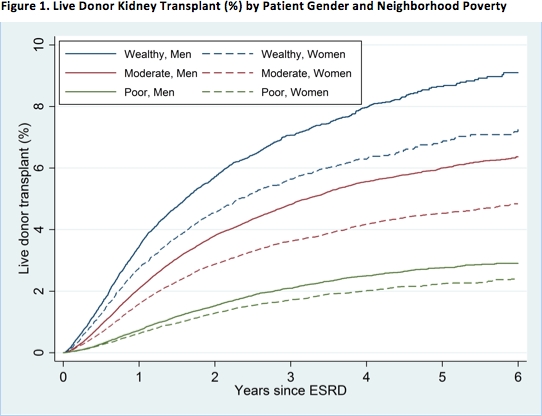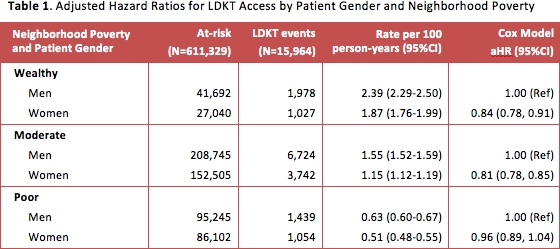Neighborhood Poverty and Gender Disparities in Access to Live Donor Kidney Transplantation.
Johns Hopkins, Baltimore.
Meeting: 2016 American Transplant Congress
Abstract number: B48
Keywords: Economics, Kidney transplantation
Session Information
Session Name: Poster Session B: Disparities in Access and Outcomes
Session Type: Poster Session
Date: Sunday, June 12, 2016
Session Time: 6:00pm-7:00pm
 Presentation Time: 6:00pm-7:00pm
Presentation Time: 6:00pm-7:00pm
Location: Halls C&D
Women are less likely to receive a live donor kidney transplant (LDKT) than men, but little is known about the contribution of poverty to this disparity. We examined the influence of neighborhood poverty on gender differences in access to LDKT among adults in the US.
Methods: Using USRDS patient data linked with zip-code level US Census data, we performed multivariable Cox regression models to analyze the association of gender with receipt of LDKT among 345,682 men and 265,647 women who initiated treatment for ESRD between January 1, 2005 and June 30, 2012. In subsequent models, we tested whether neighborhood poverty was an effect modifier of gender differences in LDKT. We defined neighborhood poverty levels as poor (≥20% poverty), moderate (5-19% poverty), and wealthy (<5% poverty).
Results: Overall, women were 16% less likely to receive a LDKT than men (aHR: 0.84, 95% CI: 0.81-0.87, p<0.001), but gender differences varied by neighborhood poverty level. (Figure 1) Women living in wealthy (aHR: 0.84, 95% CI: 0.78-0.91, p<0.001) and moderate (aHR: 0.81, 95% CI: 0.78-0.85, p<0.001) neighborhoods had less access to LDKT than their male counterparts. There were no statistically significant gender differences in LDKT access among adults living in poor neighborhoods (aHR: 0.96, 95% CI: 0.89-1.04, p=0.4), but women and men living in poor areas had the lowest overall rates of LDKT. (Table 1)
Conclusions: This study suggests that gender differences in LDKT access may be driven by a more marked disparity for women living in moderate and wealthy neighborhoods. However, adults living in poor areas had the lowest overall rates of LDKT. Targeted efforts to address income-related barriers for patients living in poorer areas and to address non-income specific barriers for women living in higher-income areas may help to improve equity in LDKT access in the US.


CITATION INFORMATION: Purnell T, Luo X, Bae S, Kucirka L, Segev D. Neighborhood Poverty and Gender Disparities in Access to Live Donor Kidney Transplantation. Am J Transplant. 2016;16 (suppl 3).
To cite this abstract in AMA style:
Purnell T, Luo X, Bae S, Kucirka L, Segev D. Neighborhood Poverty and Gender Disparities in Access to Live Donor Kidney Transplantation. [abstract]. Am J Transplant. 2016; 16 (suppl 3). https://atcmeetingabstracts.com/abstract/neighborhood-poverty-and-gender-disparities-in-access-to-live-donor-kidney-transplantation/. Accessed March 5, 2026.« Back to 2016 American Transplant Congress
